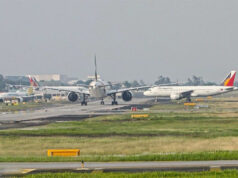LISTED Philippine airlines posted mixed earnings in the second quarter, as Cebu Air, Inc. doubled its earnings while PAL Holdings, Inc. slumped to a bigger loss.
The listed operator of Cebu Pacific booked a net income of P3.76 billion in April to June, up 101% from a year ago as consolidated revenues rose 20% to P23.53 billion.
Second-quarter passenger revenues stood at P17.67 billion, 21% higher year on year, while ancillary revenues were up 25% to P4.46 billion. Cargo revenues were flat at P1.39 billion.
For the first half, Cebu Air posted a net income of P7.14 billion, 116% higher from in the same period last year. Total revenues reached P44.7 billion, or an increase of 18% year on year.
Thanks to an 8.8% hike in average fares to P2,974, Cebu Air’s passenger revenues rose 17.8% to P33.35 billion during the six-month period. The volume of passengers also expanded 8.3% to 11.21 million due to the deployment of new aircraft that have bigger capacity.
Ancillary revenues widened 23.8% to P8.52 billion in the first half, while cargo revenues grew 6.9% to P2.84 billion. Both increases were attributed to the bigger volume of passengers and cargo transported during the period.
Expenses climbed 8.2% to P35.77 billion in the first semester, and 8.4% to P18.5 billion in the quarter ending June. Cebu Air attributed the higher costs to its expanded operations, acquisition of new aircraft and weakening of the Philippine peso in the past six months.
Meanwhile, the operator of Philippine Airlines (PAL) saw its net loss attributable to equity holders of the parent widen to P2.5 billion in the second quarter, from a loss of P290 million a year ago.
Second-quarter revenues grew 9.8% to P41.97 billion in the three-month period, but was outpaced by the 6.2% surge in expenses to P40.93 billion.
To date, the PAL’s attributable net loss stood at P3.33 billion, 138% bigger from last year.
Consolidated revenues rose 8.6% to P81.25 billion during the period, mainly due to additional flight frequencies. Passenger revenues increased by 9% to P71.13 billion, while ancillary revenues jumped 21% to P5.54 billion. However, cargo revenues fell 6% to P4.5 billion.
Expenses were 3.3% higher in the first semester at P77.75 billion, mostly due to the increase in depreciation from implementing a new accounting standard.
Maintenance costs climbed 7.8% to P10.32 billion because of the new planes PAL received during the period. Expenses related to reservation and sales went up by 14.1% to P5.98 billion due to the growth in passenger volume.
Financing charges also weighed on the company’s bottom line, as it grew 169% to P6.16 billion in the six-month period due to lease payments and the implementation of a new accounting standard. — Denise A. Valdez



